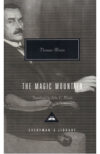The Siren Call of the "Magic Mountain"
Thomas Mann’s THE MAGIC MOUNTAIN is set in a tuberculosis sanatorium in the Swiss Alps and follows Hans Castorp, who initially plans to visit for three weeks but ends up staying for seven years. The “Magic Mountain” becomes a suspended world beyond the rhythms of everyday life, a place where time seems to stand still. Here, under the guise of healing, the guests escape the responsibilities of life in the “flatlands” below.
That was the last New Year I'll ever see
And I wanna stay on that magic mountain
With lost souls and beautiful women
Father John Misty: SO I'M GROWING OLD ON MAGIC MOUNTAIN
Father John Misty captures this seductive timelessness. He sings of a place where “nobody’s old,” inhabited by “lost souls and beautiful women.” Dance, alcohol, and sex become illusions of eternal youth. Yet beneath this deceptive timelessness lies an awareness of impermanence. Misty’s voice rises like a quiet prayer for escape—as if lingering on this metaphorical “Magic Mountain” could halt the passage of time. Musically, the song evokes this atmosphere: reverberating guitars, subtle synthesizers, and soft drumbeats create an ethereal soundscape that conveys a sense of stillness as the world fades away.
The Inevitable End
Like Mann’s sanatorium, Misty’s mountain becomes becomes a space of a different order. In its rarefied air, life’s profound questions are distilled. What Mann explores through philosophical debates between Settembrini and Naphta, Misty translates into the language of pop music: his album PURE COMEDY dissects modern strategies for finding meaning, from religion to reality TV. Within this framework, MAGIC MOUNTAIN represents its most intimate moment—a confrontation with one’s own temporality that offers no escape.
What makes life meaningful? This question drives Misty’s song. “The last night at life’s party”—this line encapsulates all the tension between celebration and impermanence, between clinging to life and letting go. The narrator shares with Hans Castorp a fundamental realization: even the longest ecstasy must eventually end.
There is no future here, he sings, and in this simple line lies the experience of all who have ever tried to live in an eternal present. The mountain’s magic proves illusory; its supposed timelessness is but a fleeting deception.
The longer I stay here
The longer there's no future
Father John Misty: SO I'M GROWING OLD ON MAGIC MOUNTAIN
What initially sounds like resignation opens up another perspective on life. In accepting transience lies the possibility of newfound freedom: The descent from the mountain thus becomes an initiation—not as defeat but as the gain of sober clarity.
From Mann to Misty: A MAGIC MOUNTAIN for the digital age
Artistic time travel rarely succeeds as beautifully as it does here: with MAGIC MOUNTAIN, Father John Misty bridges over 100 years of cultural history. The song gestures toward Mann’s THE MAGIC MOUNTAIN while remaining grounded in the present, translating the novel’s aesthetic and existential dimensions into today’s digitally accelerated world. Where Instagram promises eternal youth and Tik Tok reduces every moment to “Pure Comedy,” Misty’s song reminds us of an uncomfortable truth: life derives its depth precisely from its transience.
In the song's hypnotic soundscape—between echoing guitars and velvety beats—this realization unfolds not as a philosophical argument but as a sensory experience. Misty creates a musical space where, for nearly ten minutes, we can pause and reflect on our own temporality.
About THE MAGIC MOUNTAIN
Set in a Swiss tuberculosis sanatorium before World War I, THE MAGIC MOUNTAIN follows Hans Castorp, a young man who arrives for a brief visit and ends up staying for seven years, drawn into a world of illness, intellectual fervor, and existential exploration. Through Castorp's journey, Thomas Mann crafts a profound meditation on time, illness, and the cultural tensions of pre-war European society. John E. Woods's acclaimed translation captures the depth and irony of this masterpiece.
Although the novel was published in 1924 and is now regarded as one of Mann's most significant works, it was dismissed by the Nobel Prize Committee in 1929 as "too sprawling and too heavy"—a judgment that is now considered a historical misstep. Instead, Mann was awarded the Nobel Prize primarily for his earlier novel BUDDENBROOKS (1901), which marked his literary breakthrough.

About the author
Mirko Lux is the former editor and coordinator of MANN 2025: 150 YEARS OF THOMAS MANN. From 2013 until June 2025, he served as Program and Communications Officer at the Berlin office of Villa Aurora & Thomas Mann House. He now works as Officer for Science Communication at the Max Planck Institute for Comparative Public Law and International Law in Heidelberg. Lux studied Modern German Literature and Art History in Berlin and Siena and previously worked as a freelance journalist and photographer.
Image: © Tobias Kruse/OSTKREUZ


